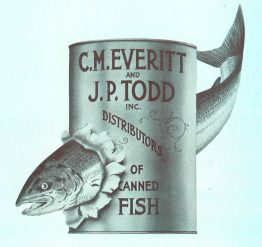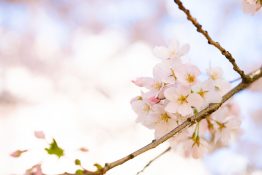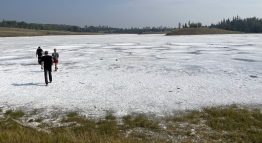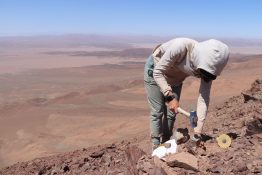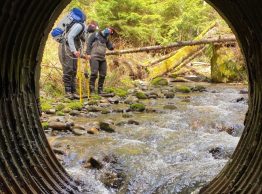Alaskan waters are a critical fishery for salmon. Complex marine food webs underlie and sustain this fishery, and scientists want to know how climate change is reshaping them. But finding samples from the past isn’t easy. “We have to really open our minds and get creative about what can act as an ecological data source,” said Natalie Mastick, currently a postdoctoral researcher at the Peabody Museum of Natural History at Yale University.
Read more at UW News »Video: UW cherry blossoms in peak bloom
The cherry trees on the UW Quad have reached their prime. A group of students in the School of Environmental and Forest Sciences has been monitoring the timing of blossoms across campus since 2018, with the goal of creating a model that will use weather data to predict the timing of peak bloom in future years.
Read more at UW News »Shallow soda lakes show promise as cradles of life on Earth
Charles Darwin proposed that life could have emerged in a “warm little pond” with the right cocktail of chemicals and energy. A new study from the University of Washington reports that a shallow “soda lake” in western Canada shows promise for matching those requirements. The findings provide new support that life could have emerged from lakes on the early Earth, roughly 4 billion years ago.
Read more at UW News »In the Field: Tracking seismic clues in one of the driest places on Earth
Unlike the Pacific Northwest, the Atacama Desert in Chile experiences very little rain. But the two regions are both seismically active. Faults in the Atacama Desert are slowly sliding past each other in a way similar to the Seattle Fault in Puget Sound and the San Andreas Fault in California. The Atacama Desert’s lack of rain makes it easier to see how those gradual movements shape the landscape over time.
Read more at UW News »DNA shows where Washington culvert replacements helped spawning salmon
To help struggling salmon populations, the state of Washington is legally required to replace hundreds of culverts that divert streams under roadways. The state transportation department is replacing old, rusting metal pipes with broad, concrete promenades that provide more gradual gradients and gentler flows for salmon swimming upstream to access more spawning grounds. The full scope of the effort will last 17 years and cost $3.8 billion.
Read more at UW News »
